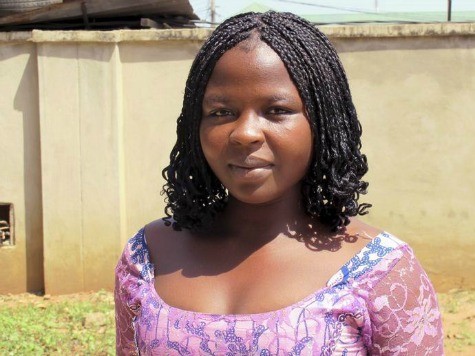In July, Christian teenager Hajja was picking corn in Gwoza, which is in the northeastern region of Nigeria, when the radical Muslim terrorist group Boko Haram, who control that region, kidnapped her. One of the men held a knife to her throat and told her he would kill her if she did not convert to Islam.
Reuters interviewed Hajja on November 6, 2013 and reported the terrorist group is now kidnapping Christian women and force them to be slave brides for their fighters. The group’s name means “Western education is forbidden” and wants to make Nigeria an Islamic state. They slaughter anyone associated with the West or Christianity. The United States finally designated them a terrorist group on Wednesday. Michael Yohanna, a councilor in Gwoza’s local government, said there are many teenagers like Hajja held captive by Boko Haram.
The three months Hajja spent as the slave of a 14-strong guerrilla unit, cooking and cleaning for them before she escaped, give a rare glimpse into how the Islamists have changed tack in the face of Nigerian military pressure.
“I can’t sleep when I think of being there,” the 19-year-old told Reuters, recounting forced mountain marches, rebel intelligence gathering – and watching her captors slit the throats of prisoners Hajja had helped lure into a trap.
A man called Ibrahim Tada Nglayike led the group Hajja was with. On one mission, Hajja was sent to stand in a field near a village to attract the attention of civilians working with the army. When five men approached her, they were ambushed.
“They took them back to a cave and tied them up. They cut their throats, one at a time,” Hajja said. “I thought my heart would burst out of my chest, because I was the bait.”
Among those who did the killing was the Muslim wife of the leader Nglayike, the only other woman in the band of fighters.
The Nigerian government, with help from the locals, set off an offensive in May and pushed the group to the Mandara mountains, which run along the Cameroon border. They took her to the mountains and slept in the caves.
She ceremonially converted to Islam, cooked for the men, carried ammunition during an attack on a police outpost and was about to be married to one of the insurgents before she managed to engineer a dramatic escape. She says she was not raped.
“If I cried, they beat me. If I spoke, they beat me. They told me I must become a Muslim but I refused again and again,” Hajja told Reuters in an interview. Her family name is withheld to protect relatives still living in the Gwoza area.
“They were about to slaughter me and one of them begged me not to resist and just before I had my throat slit I relented. They put a veil on me and made me read from the Koran,” she said in the Nigerian capital, Abuja, where she is now living.
She told Reuters the men were armed with AK-47 rifles and pistols and would constantly move during the day to avoid being seen. They did use phones but listened to the BBC and Voice of America on a radio. The men would cheer when the journalists spoke about Boko Haram attacks.
The terrorist groups choose to maneuver within poor towns like Gwoza. It allows them to brainwash the youth and recruit new members. Yohanna said Gwoza does not have the basics: no schools, hospitals or government offices. He fears this will cause a war between the Christians and Muslims.
There have been 1,708 deaths in 83 clashes since President Goodluck Jonathan declared a state emergency in the northeast region. On September 29, the group attacked the Yobe State College of Agriculture in the middle of the night and butchered 50 students while they slept.
Hajja said the unit she was in would murder anyone they thought worked with authorities. She said many locals cooperated with Boko Haram because they were scared. They would alert the group about army patrols or allow them to move around their property.
Luckily, Hajja was able to escape her captors.
Hajja eventually escaped by feigning severe stomach pains. Thinking her too ill to flee, the insurgents sent her to hospital escorted only by an older woman. Once she was among other people, Hajja threatened to denounce the group to police, prompting the woman to abandon her and flee.
“I finally tore off the veil and I cried,” Hajja said.
“So many times I thought I’d die.”

COMMENTS
Please let us know if you're having issues with commenting.